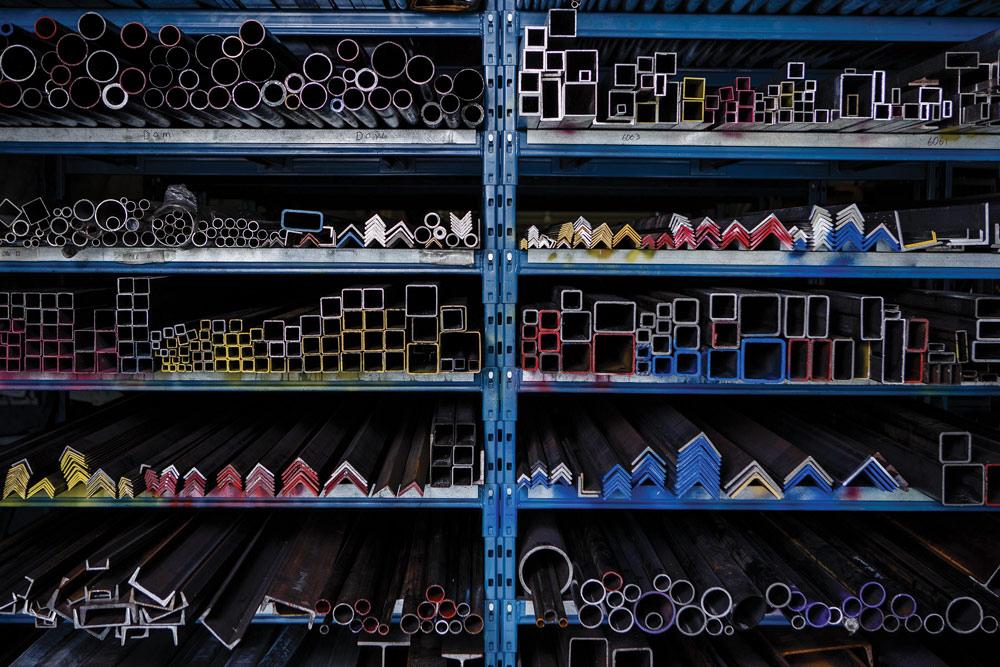president/CEO
- FMA
- The Fabricator
- FABTECH
- Canadian Metalworking
Supply chain check
With today’s unpredictability, there’s nothing like good customer intel
- By Stephen Schober
- July 5, 2021
- Article
- Management

A Metal Supermarkets study involving customers throughout its North American operations – 23 locations in Canada and 72 in the U.S. – was conducted between Oct. 30 and Dec. 11, 2020. Metal Supermarkets
We are well into the second year of navigating COVID-19, and manufacturers have found ways to adapt to the ever-changing conditions the market throws at them. The pandemic has drastically affected the outlook and day-to-day practices of businesses. For instance, while many machine shops have weathered the storm, uncertainty in supply chains has added to the daily stresses of shops trying to maintain work flow.
This point is important to Metal Supermarkets. It serves as a key supply cog in the wheel for its customers, so it has been diligent from the onset of the pandemic to ensure its customers can access the metal products they need. The metals supplier authorized an independent customer assessment study in which it aimed to understand better how well current customers’ needs and concerns were being met during the first year of the pandemic. Likewise, beyond assessing the metals supplier’s performance, the study asked specifically about customer purchasing habits during the pandemic. These insights have helped the company both assess its operations and anticipate the needs of customers amid a new normal.
And the Study Says …
The study involving a group of customers throughout Metal Supermarkets’ North American operations – 23 locations in Canada and 72 in the U.S. – was conducted between Oct. 30 and Dec. 11, 2020.
One of the most notable takeaways from the study is that in many ways customer concerns and sentiments in both Canada and the U.S. were fairly similar, but in other ways they were revealed to be quite different. In both countries, about 59 to 60 per cent of local businesses were operating as usual; 5 to 6 per cent were temporarily closed; and the balance, about 35 per cent, had restricted operations.
Just over half of the respondents, 53 per cent, felt that their revenue was relatively the same as before the pandemic, about a third of respondents reported that they had significantly lower revenue, and a little under 10 per cent reported that they were doing better. Approximately 3 to 4 per cent were closed so there was no revenue to account for.
These trends were very consistent across the two countries. Where it gets a little more interesting is looking at how optimistic respondents were to getting back to pre-COVID levels.
When this study was conducted in late 2020, Canadian respondents felt that they would be out of the pandemic restrictions and slowdowns much faster than what actually happened. Whereas U.S. companies reported there would be a longer tail on the pandemic, with expectations for a stronger economic recovery coming later in the year. Getting into 2021, Americans became far more optimistic than Canadians, who were starting to wonder when the pandemic market would get better.
The survey also asked questions about if and how shops were changing their purchasing habits. The study found that Canadians tended to be more conventional, or conservative, with their metal purchasing. Canadians used delivery more often than Americans and purchased from suppliers that they felt had good COVID safety precautions in place. Canadian customers were more likely to take advantage of pickup services as well.
Canadian customers typically held more metal inventory than Americans, expressing more supply chain concerns. And, they were more likely to be inconsistent in their purchasing habits, adjusting purchasing quantities as needed. The study suggests Canadian businesses were faster to adapt to pandemic-related restrictions, although U.S. businesses and customers followed soon after to adapt their practices around this “new normal” as well. This tends to follow general trends, particularly as we see in the news, that Canadians tend to be more concerned and take COVID-19 more seriously. The study reflects that Canadians were more cautious, careful, and took more time to consider how they should change and manage their business.
Both countries had similar opinions about the lack of long-term changes to their purchasing habits, with 84 per cent of American customers not expecting long-term changes and 79 per cent of Canadians agreeing.

People often think price is the most important factor when buying commodities. Yet the survey results indicated that flexibility, speed, metal, knowledge, and fill rates tend to be more important. JJ Gouin/iStock/Getty Images Plus
Most respondents had high hopes of life and business soon returning to normal when the study was conducted. While there has been progress, the industry as a whole is now entering a period of significant metal price inflation as well as supply chain challenges.
Supply Chain and Cost Crunch
In recent months Metal Supermarkets has heard more and more from its operations about supply chain challenges with certain types and shapes of metals. Metal costs have increased significantly as there is a North American imbalance of supply and demand.
The supply chain in the USMCA countries -- formerly known as NAFTA -- is bound together by U.S. leaders’ decisions that restricted suppliers outside of the three countries from being able to export, or competitively export, metal into Canada, Mexico, and the U.S.
With such supply restricted, and North American producers failing to anticipate the speed at which the recovery in demand would come, mill prices rose – a lot. And they continue to increase. Supply was already on the tight side because of some production problems at some of the mills, lower service center inventories, and, of course, the lack of imports.
Because of such high metal prices, importers into the USMCA countries now can absorb the tariffs and be somewhat competitive, yet the supply chain itself is challenged (container movement and ships are having their own issues), and foreign metal prices are rising as well. It will take some time for this crunch to be alleviated, and it doesn’t seem likely that prices will lower to 2020 levels anytime soon.
Given where the metal is coming from, there's probably going to be more of a squeeze in the Prairie provinces and Western Canada. Central Canada is closer to production and more robust supply chains. So, for the most part, Ontario and Quebec will have a lower magnitude of supply challenges than the rest of the country.
One of the surprising survey responses was how important service and flexibility are as compared to price. People often think price is the most important factor when buying commodities, but the survey results indicated that flexibility, speed, metal, knowledge, and fill rates tend to be more important. Of course, though, in a supply crunch, price does become secondary when the need is more apparent.
How to Secure Supply in Challenging Times
It can be tough securing metal supply (even ignoring price) at this time. And it isn’t going to get easier for some time to come. But buyers can take some steps to try to minimize the chance of disruption.
Small establishments might not be able to determine as easily as larger companies what they need and when. So, it is necessary for them to allocate more time earlier to anticipate and plan for future needs, opportunities, and challenges. It’s important for shops to give their suppliers as much time as possible to obtain the metal they need. Customers also need to maintain alternative supplier relationships. Just because supplier A doesn’t have something doesn’t mean that supplier B won’t either.
It's helpful to everyone when there's a bit more lead time to support customers. A little bit of flexibility on material type is helpful, too, so if various sizes can be used, this should be part of the discussion as well. During a crunch like this, having more options is always better.

Metal purchasers should give themselves and their suppliers as much lead time as they can. Working with suppliers early in the process and being flexible are key components in this aspect. Leonid Eremeychuk/iStock/Getty Images Plus
Despite government assurances, Canada will experience an inflationary environment. If you look around, you will notice the cost of a number of materials -- not just metal -- is increasing significantly. And this environment includes the trucking industry’s inability to access enough trucks and drivers.
Whenever customers and suppliers can work together in a way that creates a better outcome for the customer, that’s the best way to work.
Moving Forward
Metal Supermarkets anticipates choppiness in the metal supply chain for at least six to 10 months. That would be the minimal amount of time for things to get back into sync and establish more normal supply chains and potential cost reductions. It is helpful that Canada has a stable group of suppliers, many of which have been around for a long time. They have strong market knowledge and awareness.
However, looking out to a longer term, there will be a gradual movement toward more integrated purchasing relationships in which customers and suppliers share information. Digital information portals and e-commerce will continue to grow, and the market will gradually become more sophisticated in terms of transferring data and using artificial intelligence.
While it may seem like a challenge now, it will probably become easier for smaller customers to integrate and make those tools (digital portals and e-commerce) work rather than just large suppliers having access.
But for now, a number of different factors are impacting cost and the supply chain. Canadian businesses and shops need to be aware of these issues and make sure that they are as proactive as possible.
Metal purchasers are encouraged to give themselves and their suppliers as much lead time as they can, work with suppliers early in the process, and be flexible.
In a lot of ways, business is booming. There is a huge demand right now for certain projects, and with many shops working at capacity, we need to find a way to keep these projects moving forward.
Stephen Schober is the president/CEO of Metal Supermarkets, 520 Abilene Drive, 2nd Floor, Mississauga, Ont. L5T 2H7, 905-362-8226, www.metalsupermarkets.com.
About the Author
subscribe now


Keep up to date with the latest news, events, and technology for all things metal from our pair of monthly magazines written specifically for Canadian manufacturers!
Start Your Free Subscription- Trending Articles
Modest manufacturing growth appears likely

There’s no business like show business

Tighitco, DCM Group Aerospace join forces on Airbus A220 program

Software automatically identifies vulnerable production assets

NAIT names Sandvik Coromant the 2024 Distinguished Industry Partner

- Industry Events
MME Saskatoon
- May 28, 2024
- Saskatoon, SK Canada
CME's Health & Safety Symposium for Manufacturers
- May 29, 2024
- Mississauga, ON Canada
DiPaolo Machine Tools Open House 2024
- June 4 - 5, 2024
- Mississauga, ON Canada
FABTECH Canada
- June 11 - 13, 2024
- Toronto, ON Canada
Zoller Open House & Technology Days 2024
- June 12 - 13, 2024
- Ann Arbor, MI
















